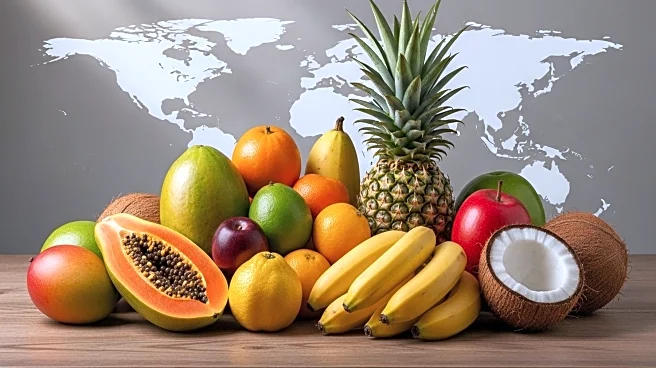What's Happening?
India and the Philippines have reached an agreement to enhance food exports from India to the Southeast Asian nation. The Philippines has decided to lift restrictions on the import of Basmati rice, which is expected to significantly increase India's high-quality rice exports. This development follows discussions between the Philippines' Secretary of Agriculture Francisco P. Tiu Laurel Jr. and Indian officials from the Agricultural and Processed Food Products Export Development Authority (APEDA) and the Indian Rice Exporters Federation. The agreement includes increased imports of Indian food products such as rice, buffalo meat, vegetables, fruits, and peanuts. This move is part of a broader strategy to diversify the Philippines' supply base amid global trade uncertainties.
Why It's Important?
The agreement between India and the Philippines is significant as it reflects both nations' intent to collaborate in agriculture, trade, and economic growth. With global supply chains facing challenges due to geopolitical shifts, such partnerships are crucial for ensuring food security and economic stability. For India, this deal is expected to boost agricultural exports, potentially leading to higher incomes for Indian farmers. For the Philippines, diversifying its import sources helps reduce dependence on Chinese products and enhances food security. The agreement is poised to strengthen Indo-Philippine economic relations and contribute to improved food security and economic expansion.
What's Next?
Following the agreement, a delegation of rice exporters from India will visit the Philippines next month to further discussions on enhancing exports. Additionally, the Philippines' food importers will participate in 'World Food India,' India's largest food trade fair, and the International Rice Conference. These events are expected to facilitate further trade discussions and partnerships between the two nations.
Beyond the Headlines
The agreement may have long-term implications for regional trade dynamics, potentially influencing other Southeast Asian countries to seek similar partnerships with India. It also highlights the growing importance of agricultural diplomacy in addressing global food security challenges.










